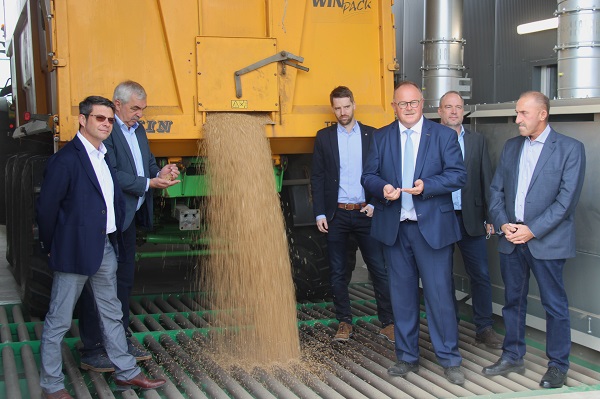 (Third from right): Luxembourg's Agriculture Minister Romain Schneider, surrounded by representatives of the sector;
Credit: MA
(Third from right): Luxembourg's Agriculture Minister Romain Schneider, surrounded by representatives of the sector;
Credit: MA
Luxembourg's Minister of Agriculture, Viticulture and Rural Development, Romain Schneider, expressed concerns over a poor grain harvest and lack of forage during talks today with representatives of the sector.
Earlier today, the Agriculture Minister visited the new premises of the Luxemburger Saatbaugenossenschaft (LSG) in Colmar-Berg to meet with representatives (LSG, De Verband, Moulins de Kleinbettingen) and to exchange and take stock of this year's grain harvest.
The 2020 grain harvest disappointed both grain producers and collectors and did not reach the yield level of previous years. The Agriculture Minister, as well as representatives of the agricultural sector, spoke of an average of 20% to 30% yield losses in grain cultivation, but also emphasised that regional yields fluctuated greatly depending on the quality of the soil. The harvest took place without any problems due to the dry weather and the quality of the harvest was good.
Steve Turmes from the LSG and Klaus Palzkill from De Verband explained that the weather has been too extreme to achieve good yields since the cultivation work last autumn. As early as the end of September 2019, uninterrupted rain made it difficult, albeit good for the formation of new groundwater, the grain sowing and the soaked soil did not allow optimal plant development. Winter barley, rye and winter rapeseed in particular suffered so much that several areas had to be plowed up in spring and sown with lower-yielding summer cereals and maize. The persistent drought in spring and midsummer in particular prevented the grain from growing normally. In addition, the area under cultivation for grain and rapeseed has declined by 10% to 40% since 2010. In turn, the area for maize and field forage has been greatly expanded.
According to Steve Turmes, the yields from the seed propagation of wheat, rye, barley and oats were also below the long-term average. The new LSG seed station is currently working without interruption in order to supply all farmers with certified quality seeds on time for the beginning of autumn, despite coronavirus-related delays in construction. Representatives of the sector stressed that marketing in the region is key to anchoring arable farming and seed multiplication in Luxembourg. Klaus Palzkill (De Verband Group - Versis) looked at producer prices and pointed out that the grain prices are currently not cost-covering Europewide.
Agriculture Minister Romain Schneider was not only concerned about the poor grain harvest, but also pointed out that less straw had been produced, which is used for littering the livestock, and that considerable losses can also be expected in forage (grassland and maize). Nevertheless, the proportion of locally grown grain stabilise and regional crop production should be maintained since the COVID-19 crisis has sparked consumer interest in locally produced food and triggered a wave of solidarity for local products.
As for the local bread grain and flour production for the label "Produit du terroir - Lëtzebuerger Wees, Miel a Brout", the family business Moulins de Kleinbettingen worked again this year with 250 local farmers, who produced an average of 18,000 tonnes of wheat, including 380 tonnes organic wheat (with an upward trend), harvested for regionally produced flour.
Minister Romain Schneider also stressed that it is vital for agriculture to adapt to the challenges of climate change and the associated extreme weather conditions. In these times in particular, taking out crop insurance has proven to be a reliable tool for farmers and winemakers to protect agricultural crops against the risks of extreme weather conditions. He advised farmers to make use of this, as this instrument allows them to cushion the impact of difficult weather conditions on agriculture. In addition, the agricultural cultivation systems, especially crop rotation, tillage and forage production, are to be adapted.
The cultivation of new drought-resistant species and varieties (e.g. soy, millet, sunflower) will also play an important role in the future. Some of these are already being tested on the test fields of the Administration des services techniques de l'agriculture (ASTA) and the Lycée Technique Agricole as well as the Institut fir Biologësch Landwirtschaft an Agrarkultur Lëtzebuerg (IBLA).








